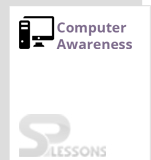 Introduction
Introduction
What is Computer Aptitude?
Computer Aptitude Test is a scientifically validated test designed to measure the aptitude for working with computers. Basically, it measures the ability to solve problems quickly that is essential to truly succeed in every field using computers.
Computers are an integral part of everyday life. Computer aptitude is an important section in many competitive exams primarily related to recruitment. Candidates preparing for banking exams like IBPS PO, SBI PO, and the RBI, must be prepared with Computer Aptitude syllabus.
"A Computer is a device that can be instructed to carry out sequences of arithmetic or logical operations automatically via computer programming". Computers follow a generalized set of operations termed as programs. The programs enable computers to perform an extremely wide range of tasks. Computers are now ubiquitous and are being used in every field of work. Thus, basic knowledge of computers and the ability to operate a computer is now crucial for all job aspirants.
Computer Awareness, also known as Computer Aptitude is one of the prominent sections in various recruitment related competitive exams in India. SBI Clerk Mains Computer Aptitude Practice Set 4 lists some of the important questions for the preparation of Computer Awareness module. The most significant topics to be learnt for Computer Awareness module are as follows:
- History of Computers
- Computer Fundamentals
- Parts of a Computer System
- Data Processing Cycle of a Computer
- Computer Languages
- Input Devices & Output Devices
- Operating Systems
- Database Management Systems
- Microsoft Office
- Keyboard Shortcuts
- File Extensions
- Networking and Internet
- Computer Viruses
- Important Abbreviations
 Quiz
Quiz
Directions(1-5): Process Control Block Questions
1. A Process Control Block(PCB) does not contain which of the following:
- A. Code
B. Stack
C. Bootstrap program
D. Data
- A. Output
B. Throughput
C. Efficiency
D. Capacity
- A. the final activity of the process
B. the activity just executed by the process
C. the activity to next be executed by the process
D. the current activity of the process
- A. New
B. Old
C. Waiting
D. Running
- A. Process type variable
B. Data Structure
C. A secondary storage section
D. A Block in memory
Directions(1-5): Deadlock Questions
1. What is the reusable resource?
- A. that can be used by one process at a time and is not depleted by that use
B. that can be used by more than one process at a time
C. that can be shared between various threads
D. None of the mentioned
- A. mutual exclusion
B. a process may hold allocated resources while awaiting assignment of other resources
C. no resource can be forcibly removed from a process holding it
D. all of the mentioned
- A. the system can allocate resources to each process in some order and still avoid a deadlock
B. there exist a safe sequence
C. all of the mentioned
D. none of the mentioned
- A. defining a linear ordering of resource types
B. using thread
C. using pipes
D. all of the mentioned
- A. banker’s algorithm
B. round-robin algorithm
C. elevator algorithm
D. karn’s algorithm
Directions(1-5): Linux Questions
1. Linux uses a time-sharing algorithm
- A. to pair preemptive scheduling between multiple processes
B. for tasks where absolute priorities are more important than fairness
C. all of the mentioned
D. none of the mentioned
- A. Linux 0.1
B. Linux 1.0
C. Linux 1.2
D. Linux 2.0
- A. ext2
B. ext3
C. ext4
D. none of the mentioned
- A. a.out
B. elf
C. both a.out and elf
D. none of the mentioned
- A. GRUB
B. LILO
C. NTLDR
D. None of the mentioned
Other Articles
 Study Guide
Study Guide
| Competitive Exams - Study Guide | ||
|---|---|---|
| Category | ||
| Quantitative Aptitude | Reasoning Ability | General Awareness |
| Computer Awareness | English Knowledge | Banking Awareness |
| General Science | World of Words | Descriptive Test |
 Exams
Exams
| Competitive Exams - College Entrance Exams | |||
|---|---|---|---|
| Category | Notification | ||
| Diploma | NITC New Delhi | ||
| Click Here For – All India Entrance Exam Notifications | |||
 Daily CA
Daily CA
 Job-Alerts
Job-Alerts
 SP Quiz
SP Quiz
| Competitive Exams - Practice Sets | |
|---|---|
| Category | Quiz |
| Quant Aptitude | Permutation and Combination |
| Spotting Errors | |
| Reasoning Ability | Puzzles |
| Insurance Awareness | Insurance Awareness |
 GK
GK
| General Knowledge for Competitive Examinations | |
|---|---|
| Topic | Name of the Article |
| GK - World | Countries Independence Day |
| First in World | |
| GK - India | Indian Power Plants |
| Pravasi Bharatiya Divas | |
| GK - Abbreviations | Indian Financial Institutions |
| Computer Aptitude Abbreviations | |
| GK - Banking & Insurance | Indian Banking System |
| Fiscal Policy | |
| GK - Science & Technology | Chemistry Terminology |
| Energy Transformation Devices | |



